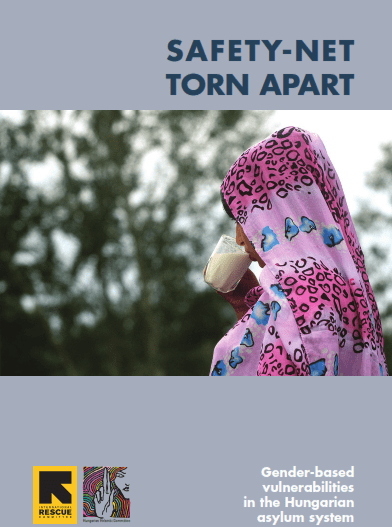Safety-Net Torn Apart
A new report by the Hungarian Helsinki Committee on gender-based vulnerabilities in the Hungarian asylum system.
The aim of the report was to map conditions and services available for girls/women and LGBTI (lesbian, gay, bisexual, trans and intersex) asylum-seekers and beneficiaries of international protection. We devoted special attention to the situation of this vulnerable group during the asylum procedure and their integration process.
The findings show that systematic and tailor-made assistance to vulnerable asylum-seekers, in particular to women and LGBTI people is missing and there is no standardized protocol for the identification and effective tackling of vulnerability-based special needs neither during the asylum procedure nor the integration process.
Key findings include:
- LGBTI and vulnerable women asylum-seekers were not provided with separate accommodation or with a separate and safe environment for activities in Hungary’s land-border transit zones (where currently all asylum-seekers are detained during the entire asylum procedure);
- Due to substandard age assessment practices, children may be detained in the transit zone for an indefinite period of time, without the right to challenge the result of an erroneous age assessment;
- The staff of the transit zones is not equipped to identify and care for vulnerable asylum-seekers, such as women victims of sexual or gender-based violence or LGBTI persons at risk of harassment, resulting in ad hoc, rather than systematic and protocol-based solutions;
- The lack of interpretation provided for interaction with medical staff and social workers makes access to needed services difficult;
- Refugees belonging to the focus groups of the study reported on the effect of the hate campaigns of the Hungarian government on their lives.
This mapping exercise made it obvious that the deliberate destruction of the once functioning Hungarian asylum system has impacted members of vulnerable groups, such as women and LGBTI people even more harshly, as there is hardly any special attention available to them during the asylum procedure and what is there during the integration process is provided by non-state actors. After the Hungarian government has decided to discontinue making EU-funding available for NGO services for asylum-seekers and refugees as of July 2018, all beneficiaries of international protection, including women and LGBTI refugees, will fall through the non-existent safety net of support.
The study can be downloaded here:
